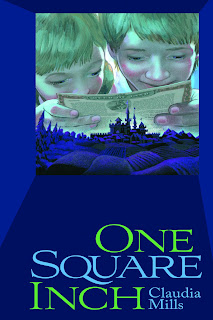April Theme: Small Bad Things
Like all
authors who try to craft a compelling story, I give my characters challenging
problems to deal with. Occasionally I
give them what the world might agree is a major problem: my recent novel One Square Inch is about a sixth-grade
boy who creates an imaginary world with his little sister where they can escape
from their mother’s bipolar disorder; my forthcoming novel Zero Tolerance is about a seventh-grade girl who finds herself
facing mandatory expulsion under her school’s harsh “zero tolerance” policies when
she brings an apple-cutting knife to school by mistake after having snatched
the wrong lunchbox off the counter that morning.
But usually
I give my characters problems that the rest of the world would think are very
small. The biggest trouble Wilson faces in 7
x 9 = Trouble! is whether he can pass all his timed multiplication tests by
the deadline to receive a promised ice cream cone. The only disasters Mason faces in Mason Dixon: Fourth Grade Disasters are
having to sing in public and having his dog eat the head off the school’s beloved
stuffed-toy-dragon mascot.
I was
criticized once years ago, in a scathing review of my book Losers, Inc. in the New York
Times (my one and only review in the Times),
for choosing to write about small problems. The reviewer mocked me for writing
about a kid who wishes he were taller, feels bad that he isn’t as successful as
his super-star older brother, and dies a thousand deaths when a girl in his
class keeps writing love poems to him. The reviewer, in a line I’ll never
forget, called my book “sanitized, censorship-proof vanilla pudding,” noting
that other authors were tackling problems like drive-by shootings and prenatal
crack addiction.
In one
of the many letters that I wrote in reply (but fortunately did not send!), I
remember saying that to write for children is almost by definition to write
about problems that the rest of the world doesn’t think are very important.
Yes, Wilson’s problems are small, and Mason’s problems are small – and Ramona
Quimby, Junie B Jones, and Clementine have small problems, too. But the
problems don’t feel small to these characters, and I don’t think they feel
small to child readers, either.
This
week of the tragic Boston Marathon explosions is a week where we know all too
well that the world is full of huge, terrible, brutal, hideous cruelty. But
there is still room in children’s fiction for honoring the small problems of
children, problems that matter to the small people who live them, however
little they matter in the scheme of things. Even as I’m reeling from the senseless
carnage in Boston, I still care whether or not a third grader can earn his
math-reward ice cream cone, and whether a fourth grader who hates to sing can make
himself step up to the microphone to help his best friend overcome stage fright
during a school concert.
Small things
matter, too.


So true, Claudia! Being chosen last for a sports team or getting an insult hurled in your direction may seem insignificant, but they can stay with you, and shape who you are. I still remember cruel remarks from childhood. Here's to the small things and learning how to cope with them, so they don't become big things!
ReplyDeleteThanks, Claudia! Small problems seem so big sometimes because everyone else thinks they are small. With a big problem, it's more obvious that help is needed. And who can help but people who have practiced with small problems of their own?
ReplyDeleteThank you for this post, Claudia! It's so easy to call someone else's worries trivial, especially when that someone else is a child.
ReplyDeleteThanks for writing about "small" problems, Claudia. I often wonder if one small thing happened to these perpetrators of horrific violence -- one person telling them that they were tall enough, or who gave them an ice cream cone, or a smile -- might things be different? We'll never know, of course, but in solving those small problems, kids can find the strength and courage to solve the big ones when they arise.
ReplyDeleteI love that last line...
ReplyDelete